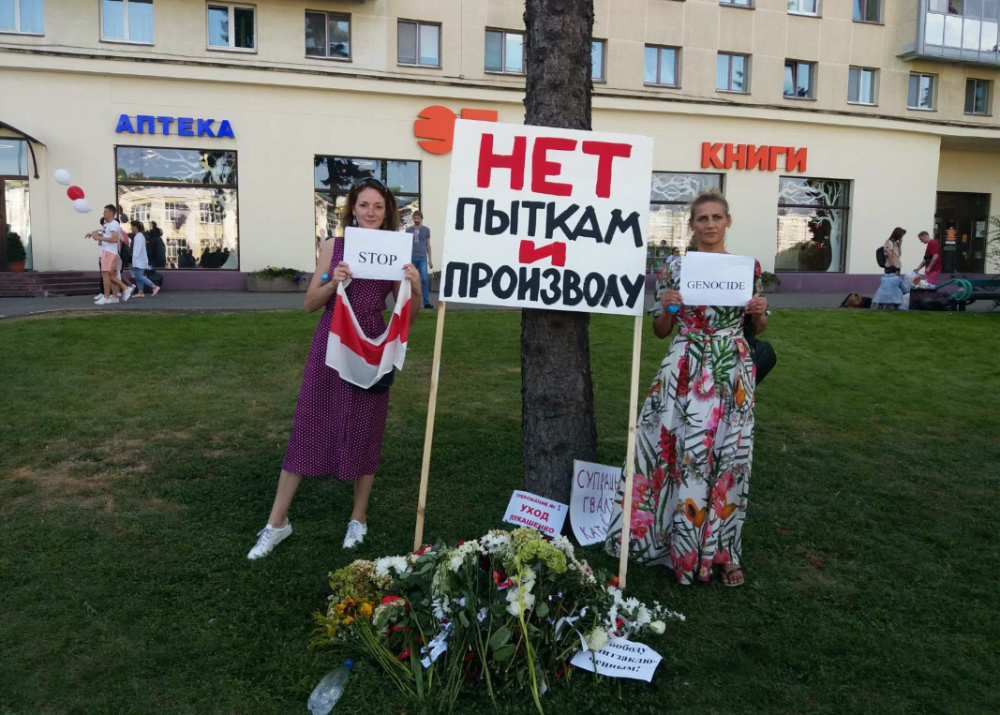London, UK
Thomson Reuters Foundation
Dressed in white and carrying flowers, Belarusian women have taken to the streets in an unprecedented show of female solidarity to call for President Alexander Lukashenko to quit, urging other women at home and abroad to join them.
Known as the “Women in White”, female demonstrators have organised protests in Minsk but also in Germany, Poland, Belgium, Ukraine and Russia to demand an end to the violence that erupted after Lukashenko’s disputed 9th August re-election.

Natallia Kharytaniuk (left) and Nadzieya Staurova (right) hold banners, standing by a poster saying “No to tortures and despotism”, at a rally against Belarusian President Alexander Lukashenko, Minsk, the capital of Belarus, on 16th August. PICTURE: Courtesy of Natallia Kharytaniuk/Thomson Reuters Foundation
A social media video with the hashtag #she4belarus released at the weekend urged others to join the protests.
With hundreds of thousands joining protests over the past nine days, police have detained up to 7,000 people, with at least two people dying, and online videos of beatings and reports of torture in jails gone viral.
Natalia Skibska, a translator and psychologist, said she was spurred into action after her 20-year-old son was arrested, jailed for six days, and beaten – for doing nothing wrong.
“My son is a barman in a French restaurant and he has never been involved in politics, never been in trouble. He disappeared for four days and I did not know where he was,” Skibska told the Thomson Reuters Foundation from her home in Minsk.
“I want to live in a country where I can be sure my son comes home safely every night. The law here is not protecting us. We need a shift in government.”
Many women have taken to the streets for the first time in their lives in the former Soviet republic of 9.5 million people to protest about the election that opponents say Lukashenko rigged to secure a sixth term after 26 years in power.
He denies losing, citing official results that gave him over 80 per cent of the vote, but workers at some of the country’s biggest state-run industrial plants, the backbone of Lukashenko’s Soviet-style economic model, have gone on strike in protest.
Natallia Kharytaniuk, a 35-year-old English tutor, said she was joining protests daily, dressed in white, and would continue to do so until the situation changed.
“This movement of women has been such a shock and a surprise, and all of us women are now asking where everyone has been all this time,” Kharytaniuk, who has a seven-year-old son, told the Thomson Reuters Foundation by phone from Minsk.
“Now this is not just about politics. If is about family life, it is about relationships with husbands. We have a very patriarchal society but when the revolution is over that will have to change.”
Social media planning
Natalia, a 34-year-old English teacher who did not want to use her surname to protect her security, said she had never attended a protest before but joined after seeing plans on mothers’ groups on the Viber app and then Telegram.
She said she was frightened at first but was reassured when so many women came out to join the peaceful protests, advised to bring rubbish bags with them and food and water to share.
“I have never seen such solidarity between women before as we are usually quite passive but now we are very united,” she told the Thomson Reuters Foundation by phone from Minsk, where she lives with her husband and three children.
“Women don’t want to just say at home and cook soup. Seeing so many women dressed in white, smiling and with flowers, has been inspiring and I now believe women in Belarus will have something more important.”
She said it made sense that women were out in the streets with a trio of women becoming the main symbol of the opposition. The main opposition presidential candidate Svetlana Tsikhanouskaya, 37, who fled to neighbouring Lithuania on Tuesday, has called for an election recount.
She announced her candidacy after her husband, a blogger, was arrested in May, saying she just wanted to support him.
She joined forces with the campaigns of two other female candidates barred from taking part in the election – Veronika Tsepkalo, who has also fled Belarus, and Maria Kolesnikova, who is still in Minsk calling for free and fair elections.
“We want an election we can trust and all the prisoners released – and the more women everywhere who can join us, the better,” said Natalia, who had attended four protests so far.
Women from Belarus living in other countries have joined the protests and urged others to do so to add global pressure on Lukashenko to quit, mobilising under the #she4belarus hashtag.
Hanna Staehle, 34, a senior manager in the charity sector who has lived in Germany and Russia for the past 12 years, joined protests in Brussels last week with plans for more.
“We cannot just watch and see this happening without doing anything. This is no longer just about the election but about the safety of people who are protesting without violence,” she told the Thomson Reuters Foundation.
“We need to put pressure on Europe.”





